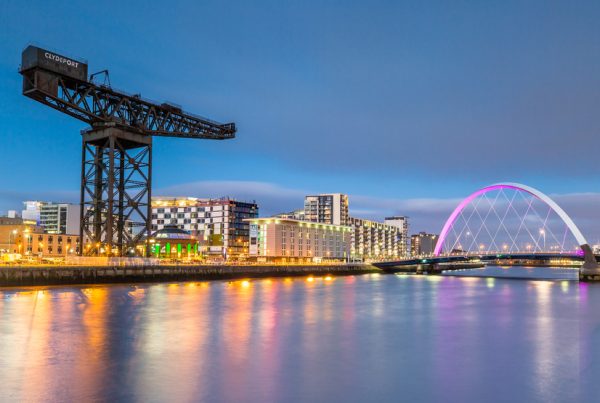Insights from COP26 – Week 2
SEC Newgate UK has a team at the event in Glasgow providing bitesize daily updates in our ‘Insights from COP26” blog series – read this week’s daily round ups as the week and conference comes to a close.
Day 8 – Adaption, Loss and Damage Day
By Andrew Adie
Day eight and the start of week two is arguably the point where COP26 becomes a real diplomatic slog.
The world leaders have come and gone, many of the key announcements have been made (with some significant progress and the IEA calculating that the commitments made so far, if implemented, would cut global warming to 1.8C). Now the tough negotiations are really hitting their stride.
If the aim of COP26 (to keep ‘1.5 alive’) is to be realised, then we need to see countries committing to faster and deeper carbon cuts and we need a breakthrough on diplomatically tortuous issues such as Article 6.
Article 6 was a point of much debate today, as it lays the foundation for a global carbon pricing and carbon trading regime that either has the potential to enable us to put a value on protecting nature, allow countries to pay to offset carbon outputs and channel funds to developing nations; or to provide a playbook for greenwashing – depending on how the final agreement looks.
Agreeing Article 6 has eluded negotiators since 2009 and getting agreement on it will be a key metric for success at COP26.
The other ongoing topic for debate on adaption loss and resilience day was the need for the G20 countries to meet the broken promise to deliver $100bn a year in financial support to developing nations to enable them to meet the cost of adapting to a net zero world. The UK today announced that it would give an additional £290m a year but the full $100bn funding has still not been pledged.
The weekend also brought 100,000 people onto the streets of Glasgow for the Global Day of Climate Justice with the broad consensus that COP26 hasn’t yet delivered enough and that the politicians need to work harder.
Into this atmosphere strode Barak Obama. Greeted by crowds, cheering and a reception that most serving global leaders would pray for, Barak Obama’s message to the world, and to COP26, was simple: We need to do more, we need to move faster and we’re running out of time. He pledged that America was back and called on world leaders and negotiators to be ambitious and was critical of Russia and China for failing to play a full role in the Conference.
He also praised the world’s youth for standing up and demanding faster action and called on voters (particularly young voters) to be more activist – to put pressure on governments to deliver decarbonisation targets and do more to protect the planet. His closing comment: “I’m ready for the long haul if you are, so let’s get to work,” suggests he intends to continue his leadership on these issues. The only mar on an otherwise powerful return to the global stage were tweets from activists repeating again that they had no access to the COP26 venues, so they couldn’t directly listen to his message for the world’s youth.
To add to the pressure on delegates, Global Witness has released analysis today showing that there are more delegates from the fossil fuel industry at COP26 than there are from any single country.
While week one saw some strong progress and a feeling that COP26 had got off to a better start than many feared, with a strong focus on solutions and the role of the private sector in driving forward the transition to net zero, week two is shaping up to remind us all that more needs to be done if Glasgow is to deliver real impact in the battle to ‘keep 1.5 alive’.
The coming days will be crucial and the pressure is growing.
Day 9 – Gender, Science & Innovation Day
By Andrew Adie
In the final days of the COP26 negotiations, the pressure is really mounting. Climate Action Tracker this afternoon published its analysis of countries’ pledges on greenhouse gas emission reductions and says the world is heading towards 2.4C of warming by the end of this century. This is based on analysis of the short-term pledges to hit milestones for 2030 (which are critical if we are to ‘keep 1.5 alive’, and which many would argue is reflective of what is actually being delivered rather than longer term pledges which have a more aspirational quality).
The findings from the highly respected Climate Action Tracker sit in contrast with earlier more positive statistics from the IEA which said the pledges made at COP26, if implemented, could cut global warming to 1.8C (but this was based on longer term commitments to the end of the century).
It’s a point that activists and others are grasping onto as they call for the politicians to do far more to ‘keep 1.5 alive’, and to deliver meaningful goals leading up to 2030.
As the negotiations enter their final days (and nights) delegates are looking at the compromises that could be made, allegedly including requiring countries that aren’t prepared to commit to 1.5C now to support stronger targets next year.
A key sticking point remains the reporting of greenhouse gas emissions with China and Saudi Arabia reported to be unhappy about proposals that measure emissions reductions per unit of GDP. Attempts to strengthen commitments to limit warming to 1.5C are also reported to require far faster decarbonisation and switching from fossil fuels.
Gender, Science and Innovation Day has focused heavily on the negative impact of climate change with a number of rather depressing updates including:
- A Met Office study has found that 2C global warming would result in a significant spike in the number of people suffering from heat and humidity stress (which can be fatal) saying the numbers affected will rise from around 68 million today to around one billion. By 2070 summer temperature in the UK could rise and see 30C on consecutive days and rain flow could also increase by 35%
- Findings from the Lancet Countdown report found that in 2019, 345,000 people over the age of 65 died from heat exhaustion, a record high
- Today has also heard about the impact of climate change on women and girls who are disproportionately impacted. Speakers have highlighted increasing domestic violence as families feel the stresses of increasing poverty and hardship as a result of climate change. The role of women in searching for food and water and having to market produce in regions that are experiencing drought, floods and extreme weather has also been discussed.
- In addition, ‘Little Amal’, the puppet of a Syrian refugee which has journeyed 8,000 km from Syria through Europe to be at COP26 has also highlighted the plight of those forced to flee as a result of climate change and conflict
- US House Speaker Nancy Pelosi also arrived in Glasgow today with a delegation of Democratic politicians and used her first speech to highlight that women and indigenous communities are facing the brunt of hardship in areas most impacted by climate change
There have also been some signs of progress with the UK government announcing £165m to tackle the gender inequalities caused by climate change, and 22 countries and the European Commission announcing Mission Innovation to unite investors, governments, and NGOs to invest in clean energy technology.
Today’s developments are unlikely to help sleep-deprived diplomats to rest easy. The pressure is growing for breakthrough announcements at the end of this week that enable COP26 to deliver its mission of commitments to limit global warming to 1.5C. Based on developments in the past 24-hours there is still much to do.
Day 10 – Transport Day
By Andrew Adie
With just two days left before the end of the COP26 Conference the negotiations are now focusing on the final text for an agreement. Unusually, the initial draft has been published which calls on all countries to come back in 2022 with strengthened NDC targets that enable the world to deliver no more than 1.5C global warming.
The draft text has prompted a mixed reaction, with some saying it lacks ambition while others praise the boldness of the negotiation strategy , which appears to be driven by a desire to expose any country that feels unwilling to commit to 1.5C targets. There has been much focus on Saudi Arabia with Greenpeace claiming that it is acting as a blocker on a 1.5C agreement. The draft agreement also calls for developed nations to double the transition funding for developing economies and calls on more stringent targets for phasing out coal and removing subsidies for fossil fuels.
How that draft text evolves over the coming days will be fascinating to watch and critical to the success of the Conference, many observers have called for the text to be a floor not a ceiling as discussions inevitably run into the nights, as well as days, ahead. The pressure from activists and those countries most at risk of climate change continues to build on the back of yesterday’s devastating Climate Action Tracker report that said the world was on track for a 2.4C temperature rise, despite the pledges made in Glasgow.
Transport Day also saw a strong spike in corporate activity and public and private sector announcements, including the announcement from the UK government that all HGVs sold in the UK will, by 2040, have to be zero emission.
There has also been a declaration, signed by 33 countries and manufacturers including Ford, Mercedes-Benz, Volvo, Jaguar Landrover and General Motors to work towards 100% zero emission new car and van sales by 2040, and by 2035 in leading markets. The UK has previously announced a ban on all new petrol and diesel car sales by 2030.
Logistics UK outlined its plans to deliver a ‘route to net zero’ and electric truck manufacturer Tevva announced that it is on course to deliver 3,000 electric trucks per year by 2023 in the UK as it called for faster action to deliver a net zero transport revolution and announced that its EV trucks would eliminate the equivalent of 10 million tonnes of GHG emissions by 2030.
In other corporate developments, EasyJet used Transport Day to announce that it has signed up to the Race to Zero (to achieve net zero by 2050) and Alstrom and Eversholt Rail announced a memorandum of understanding to deliver a fleet of ten hydrogen trains into the UK. The Green Finance Institute, through the Coalition for the Decarbonisation of Road Transport, published 18 recommendations (including increasing loans capacity and standardising battery health certification to boost confidence in the used EV market) to finance the uptake of EVs. The recommendations, drafted by a coalition of 200 experts, sets recommendations for a financial framework for EVs which it says could enable the UK to unlock £150 billion in private investment into EVs and EV charging infrastructure.
Andy Burnham, Mayor of Manchester, also announced that Manchester’s transport network will be net zero by 2030 and called for greater efforts to cur the cost of public transport across the UK.
Day 10 has delivered a range of positive initiatives but also raised the stakes for the days ahead. COP26 has delivered good progress but it will only be judged a success if that 1.5C target looks to be in sight. At the moment, particularly in light of the Climate Action Tracker report, that still looks a tall order.
Day 11 – Cities & Built Environment Day
By Andrew Adie & Dafydd Rees
Today’s theme here in Glasgow is devoted to Cities and the Built Environment, yet broader themes dominated discussions outside the conference halls.
Last night’s surprise joint statement from the US and China that they will work together to limit global warming and achieve the 1.5C temperature ceiling for global warming has increased pressure on other countries to commit to tighter targets.
The US and China are the world’s two biggest emitters of greenhouse gases and are expected to meet very soon (possibly next week) to discuss more stringent measure to reduce methane emissions and tackle deforestation. China has also repeated a promise that it will speed up efforts to reduce its reliance on coal. The Secretary General of the UN says it’s an important step in the right direction.
In the final days of the Conference the pressure is mounting on negotiators to reach new emissions reduction targets that ‘keep 1.5 alive’. Yesterday’s final draft text (published by the UN) urged the 197 countries at these talks to strengthen their 2030 climate targets and establish new targets by the end of 2022. China and Russia have signalled they want to keep to the existing five-year timeframe of setting carbon emission goals.
The United Nations Environment Programme says emissions would need to fall by half this decade to keep global temperature rises to the target of 1.5C. There is also a clause asking for a commitment to phase out coal and subsidies for fossil fuels. India has signalled its looking for a trillion-dollar commitment from the developed world by the end of the decade before it agrees to new targets to cut emissions.
Alok Sharma, President of COP26, said in a media conference this afternoon that finance (notably the $100billion reparation payments for developing nations from the G20 nations – which are the most polluting and larger economies) is still a sticking point, as reportedly is Article 6 which sets the framework for carbon pricing and trading.
In other news Costa Rica and Denmark announced a new global coalition, Beyond Oil and Gas, which will end the granting of new licences for exploring and extracting oil and gas. Other signatories to the new agreement include France, Greenland, Ireland, Quebec, Sweden and Wales.
There has also been plenty of discussion and case studies presented of the work being undertaken by cities and urban administrations to mitigate the impact of climate change and decarbonise urban areas.
However, as we move into the last day of COP26 all eyes are on the big prize. Will we get a global commitment to decarbonise faster and keep 1.5C global warming within reach? Negotiations will continue through the night and into tomorrow with the answer revealed at the end of COP26 news conference.
Day 12 – The final day of COP26?
By Dafydd Rees and Andrew Adie
Friday 12th November may or may not be the final day of COP26. Officially the Conference ends at 6pm this evening, in reality fundamental differences remain on the nature of the final agreement to be reached. Alok Sharma who is COP26 President has said that in his view it is still possible to achieve the target set of keeping global warming to 1.5C. Talks may well continue until the weekend and beyond the official deadline tonight.
A commitment to accelerate the phasing out of coal and fossil fuel subsidies has been weakened but currently remains in the text of the final COP26 deal. Such a call has never before appeared in the final text of a UN climate conference. The language now being used refers to “unabated” coal power and “inefficient” fossil fuel subsidies. Governments around the world currently spend hundreds of billions of pounds a year subsidising the production and consumption of fossil fuels. India has said it opposes the move while Saudi Arabia has denied it is seeking to prevent a final agreement.
China is expected to oppose the proposal from the UK and US that individual countries should be “requested” to improve on their official climate plans for cutting greenhouse gases known as nationally determined contributions by the end of next year.
Another unresolved issue is the delivery of the promise made in 2009 of $100bn per year in climate finance for poor countries by 2020. Developing countries want a stronger commitment to increased funding from the developed world. The current pledge is that this target will be met by 2023.
Disagreements remain over a framework for international carbon offset markets. Negotiators have yet to agree international rules for trading carbon offsets or credits. The latest development appears to be a plan to create two different types of emissions credits and a new approach to prevent double-counting. Major countries such as the US oppose a mandatory levy on carbon credits that would contribute to an adaptation fund for poorer countries. Discussions are said to be in the balance.
How these negotiations conclude is critical. NGOs have pointed out that the difference between 1.5C and 2C is the difference between having some coral reefs and having none. For come countries and economies the impact would be equally devastating.
Much has been achieved at COP26, business and finance have stepped into the fray, the US has been back and engaged, key agreements have been reached to preserve forests, oceans and tighten reporting frameworks for business around carbon reduction. Agreements to limit coal use and reduce fossil fuel exploration have been hatched albeit with limited support.
Yet, the absence of China and Russia from Glasgow inevitably means that much will pass to COP27 next year in Egypt. Ensuring a framework is in place that keeps 1.5C in reach, drives a just transition and drives down carbon emissions remains vital if the Conference is to come close to achieving a meaningful impact. The coming hours remain critical.
The SEC Newgate Global ESG Monitor is a groundbreaking research project across 10 countries that examines how environment, social and governance issues are influencing perceptions of business and governments.
CLICK HERE
TO DOWNLOAD THE ESG MONITOR REPORTS








